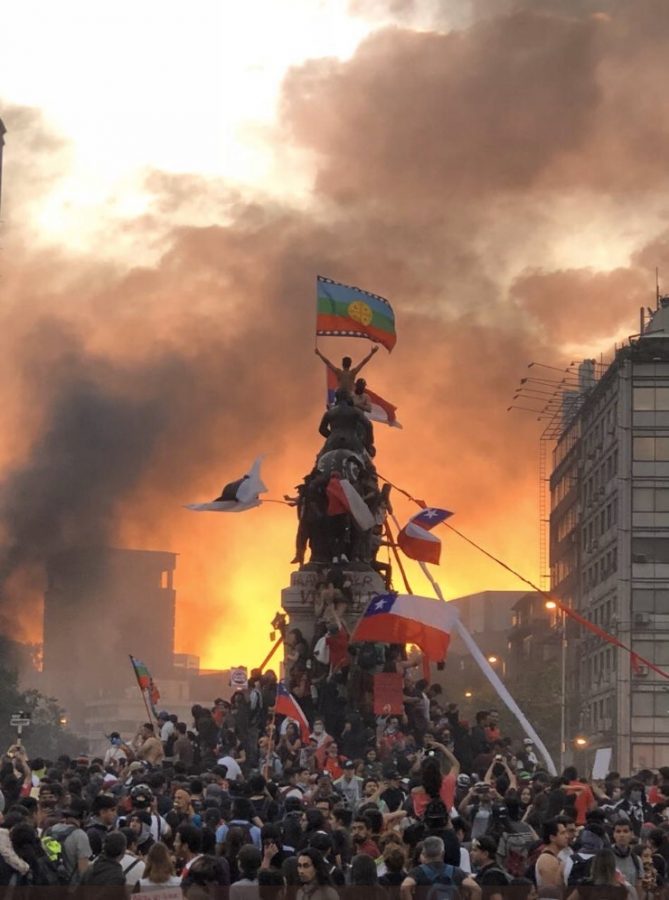Massive Economic Inequalities Fuel Latin American Protests
Photo Found on Twitter @redfishstream
Latin America remains one of the world’s most unequal regions. People have protested before, will this time be enough?
Latin America remains one of the world’s most unequal regions, and many people have had enough. Countries have broken out in protests and citizens have gone to the streets in the hopes that their voices will be heard and real change will happen.
Argentina is in the midst of a changing government as Alberto Fernandez has just been elected president. The citizens of Argentina hope with a new leader they will be able to improve their economic conditions, according to Project Syndicate, as their country has been riddled with high debt, ridiculous inflation, and unemployment. The country still remains undivided, as there are many opinions on how to get there and who can get them there.
Bolivians have stormed the streets after the reelection of Evo Morales, their president since 2006. According to The Washington Post, many believe the election was rigged and fear for the fate of their democracy. Luis Fernando Camacho, a prominent leader of the opposition movement, set a deadline for Morales’ resignation, which Morales failed to follow, causing a surge of protests. According to the NY Times, the protests have grown increasingly violent, leading to the assault of a mayor among others.
The Organization of American States (OAS) will conduct an inspection of the election. Bolivia is more divided than ever. After Morales fled, his supporters flooded into the streets chanting civil war. Currently, Bolivia is leaderless. Jeanine Anez Chavez, who was the Senate’s second vice president, has decided to fill that role for now, according to the NY Times. To learn more, click here.
Chilean students began protesting unfair transportation fare increases a month ago. What began as fare dodging turned into violence. According to Reuters, two weeks later President Pinera “extended a state of emergency” for many cities, including the capital. The increase in subway fares was the breaking point for the citizens of Chile who had suffered massive economic inequalities for 30 years. According to the BBC, Chile has one of the highest inequality rates, according to the Organization for Economic and Cooperation and Development (OECD).
The government has issued emergency measures, such as increasing the minimum wage and increasing taxes for the wealthy. After years of economic inequality, these solutions were too little and too late. Protesters are now asking for President Pinera’s resignation and a change to the constitution that was created when it was a dictatorship. The Guardian spoke to the protesters about why they’re fighting for change, and Vox summed up the actions that have been happening this month.
Ecuador’s decision to end the use of fossil fuel subsidies caused a hike in gas prices nationwide. Many across the country can’t pay for the extreme price difference and have gone to the streets to demand change. Lenin Moreno, the president of Ecuador, hoped this would stimulate the economy and save the government billions. Protesters and Moreno eventually agreed to a deal. According to NPR, both sides say they’re committed to restoring peace.
Paraguay’s government approval rating is at a current low, with a 69% disapproval rate; the hidden deal concerning the hydroelectric power plant deal with Brazil was enough to push them over the edge. According to The Conversation, through the deal, the people of Paraguay would have even less access to cheap energy. They have begun protesting their president, Mario Abdo, and are hoping for impeachment.
The president of Peru, Martin Vizcarra, has tried to force new elections by getting rid of Congress. Protester have shut down mines, thus ending production. This come after months of Peru’s entanglement with and construction company, Odebrecht, centered in Brazil. This situation caused Past President Pedro Pablo Kuczynski to resign, and another Past President to die by suicide after it was decided he was also connected.
While many believe these protests won’t have much effect in the long-term according to Foreign Policy, we must acknowledge the protestors’ bravery for fighting for what they believe in and hope that they can make change.

Hi I'm Alejandra! I'm a senior and this is my third year writing for The Chieftain. Some of my interests include reading, plants, and my kitties. I'm very...



